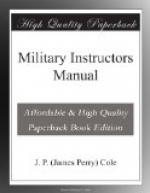(d) THE TROOPS march in column of squads until under the observation of the enemy. Platoon columns are used in crossing ground where there is cover. Squad columns are used across the artillery zone. At approximately 800 yards a skirmish line is formed. Thin lines may then be used to advance to the attack. Remember the Major has assigned each company in the firing line an objective. Be sure to watch out for flank protection. If the Major has forgotten to have combat patrols on the exposed flank or flanks, it is up to the flank company to send out a combat patrol. This patrol should be slightly in advance of the front line, and off to the right or left. The advance is made by a fraction rushing forward. These rushes are from 20 to 80 yards. When a rush is made the remaining troops fire faster. The firing line should not be reinforced by less than a platoon. The Major determines when to fix bayonets. The front rank men fix bayonets first, the rear rank men fire faster, then the rear rank men fix bayonets while the front rank fire faster. A battalion is the smallest unit in the firing line to inaugurate a charge. Remember the battalion is the attack unit.
In changing sight setting follow same plan as fixing bayonet, i.e., each front rank first, the rear rank man firing faster, etc.
(e) DEFENSE.—In defense the line is usually stronger and the support weaker than in the attack. Do not give up your ground unless you have written orders from the High Command. Watch out for flank protection by combat patrols.
(f) LEADERSHIP.—A good leader should possess self reliance, initiative, aggressiveness, superior knowledge, and have a conception of teamwork. Make your work a game in which each man has a part to play. Reward merit and give the disagreeable things to be done to the “knockers.” A leader must know his men. Never give them a job to do that you couldn’t do yourself. Train yourself to estimate the situation quickly and calmly. Have your men well disciplined, well drilled, well equipped, and well dressed. It might be called unmilitary by some of the sterner characters in our service, but we believe by occasionally drawing comparisons to something real amusing—a good joke—you show your men that the “old Man” is really made of human stuff. Be sympathetic, and it has been shown by experience that, for some slight breach of discipline a “little talk” in the orderly room does the most good, and is the best form of punishment. Do your work cheerfully, and your men will do likewise. Keep yourself abreast of the times in all matters military—remember your men look to you in time of action and excitement and you must be ready to deliver the goods. Work out and plan your orders, etc., simply. Morale is the greatest asset an organization can have. Keep all your troubles and have the men keep theirs within the company. Have esprit de corps. The real successful leader knows and plays the game.




